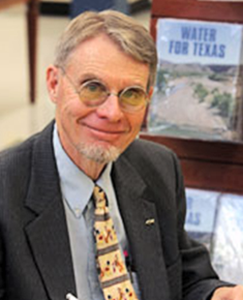 Regents Professor Emeritus of Geography Dr. Jim Norwine of Texas A&M University-Kingsville will discuss his findings regarding climate change and the “culture-shift” that underlies current discussion on this hot-button topic during his Sept. 3 lecture at Rogers State University.
Regents Professor Emeritus of Geography Dr. Jim Norwine of Texas A&M University-Kingsville will discuss his findings regarding climate change and the “culture-shift” that underlies current discussion on this hot-button topic during his Sept. 3 lecture at Rogers State University.
Norwine’s lecture will be held at noon, Thursday, Sept. 3, in the Baird Hall Performance Studio on the Claremore campus. His talk will be focused on the topics raised in his latest book, “A World After Climate Change and Culture-Shift,” published by Springer Books and available through Amazon.com. The lecture is free and open to the public. This event is sponsored by the RSU Departments of Biology and Mathematics and Physical Science.
Now a retired resident of Rogers County, Norwine taught at Texas A&M-Kingsville for 40 years, from 1972 to 2012. He maintains his research work on the earth’s climate, a passion since the 1960s when he wrote a cover article for the Bulletin of the American Meteorological Society termed “ground-breaking.” When Norwine arrived at A&M-Kingsville, he narrowed his climate study to the regional climate and climate changes of South Texas and similar semi-arid regions.
For Norwine, a geographer was meant to study the interaction between humans and nature, and he felt climate was “an example par excellence” of this intermingling. Climate is a long-term measurement of weather that can be marked over generations, and millennia. Norwine states that at the start of his climatology studies, scholars tended to view climate as more or less fixed or constant. The point of view has evolved to reflect that Earth’s climate is dynamic—locally, regionally and even globally, Norwine said.
Natural climate changes cited by Norwine include the sun’s output, volcanic activity and extreme extinction-level events, like the asteroid strike that ended the age of dinosaurs 65 million years ago. But it’s the anthropogenic—or human-cause—global warming changes mentioned more frequently in the news, and Norwine supports their influence. In particular, how the use of fossil fuels—especially over the last 75 years—has raised the amount of carbon dioxide in the atmosphere to its highest level in two million years. This “greenhouse gas” absorbs sunlight and contributes to a warmer earth, according to Norwine.
The lecture will draw from articles featured in Norwine’s book. Those articles are written by an international team of environmental and social scientists, who describe the current state of climate change, and the possible effects of those changes on Earth and humankind into the 22ndcentury. What’s more, the book examines what Norwine terms as an emerging, major “culture-shift” responsible for the current controversy that surrounds climate change. The new values of typically younger “progressives” – toleration, choice, personal lifestyle and environmental well-being – are clashing with “traditionalists” and their values of family and duty. The result, Norwine said, is a situation in which agreeing about any major challenge, be it climate change, terrorism or economics, becomes extremely difficult.
